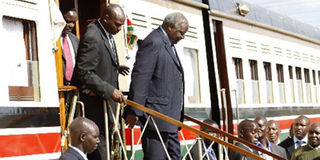Kibaki launches Sh400m Syokimau Rail Service

President Mwai Kibaki (front) alights from a train after the opening of Syokimau Railway Station on November 13, 2012. Photo/STEPHEN MUDIARI
What you need to know:
- Syokimau Railway Station will impact positively on traffic management in Nairobi and its suburbs
President Mwai Kibaki on Tuesday launched the Syokimau Rail Service marking a major milestone in the history of railway development in the country.
Syokimau Railway Station will impact positively on traffic management in Nairobi and its suburbs.
Kibaki said the commuter rail service will also improve the socio-economic welfare of citizens, while at the same time enabling Nairobi to remain the regional economic, commercial and business hub in
the region.
Kibaki reaffirmed the government’s commitment to continue investing in rail infrastructure development, especially in commuter transport, in order to improve transport services and facilitate economic development.
He said plans have been finalised to construct the Imara Daima and Makadara railway stations while the design work for the development of similar transport systems in Mombasa and Kisumu cities is in progress.
In addition to these projects, Kibaki said Kenya is collaborating with other countries in the region to develop railway infrastructure in order to improve regional connectivity.
“The development of railway infrastructure will supplement the other modes of transport, thereby enhancing trade relations and economic integration,” he added.
Kibaki said Kenya has signed a bilateral agreement with Uganda to facilitate joint development of the Mombasa-Malaba-Kampala standard gauge railway. A branch line will also be extended to Kisumu.
“Similarly, we have signed a Memorandum of Understanding with the Government of Ethiopia for the development of Lamu-Addis Ababa standard gauge railway. Under the Lamu-South Sudan and Ethiopia Transport Corridor Project, the development of a railway component is among the priority projects,” Kibaki said.
The development of these critical transport facilities will, besides reducing transport costs due to faster movement of goods and people within the region, also increase trade, improve the socio-economic welfare of Northern Kenya and boost the country’s potential in attracting investments from all over the world, Kibaki added.




